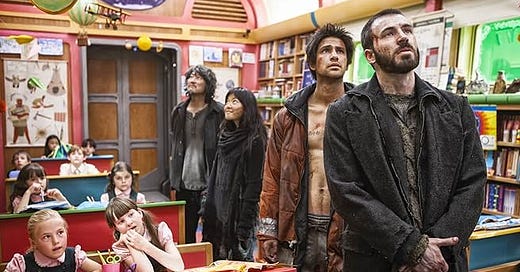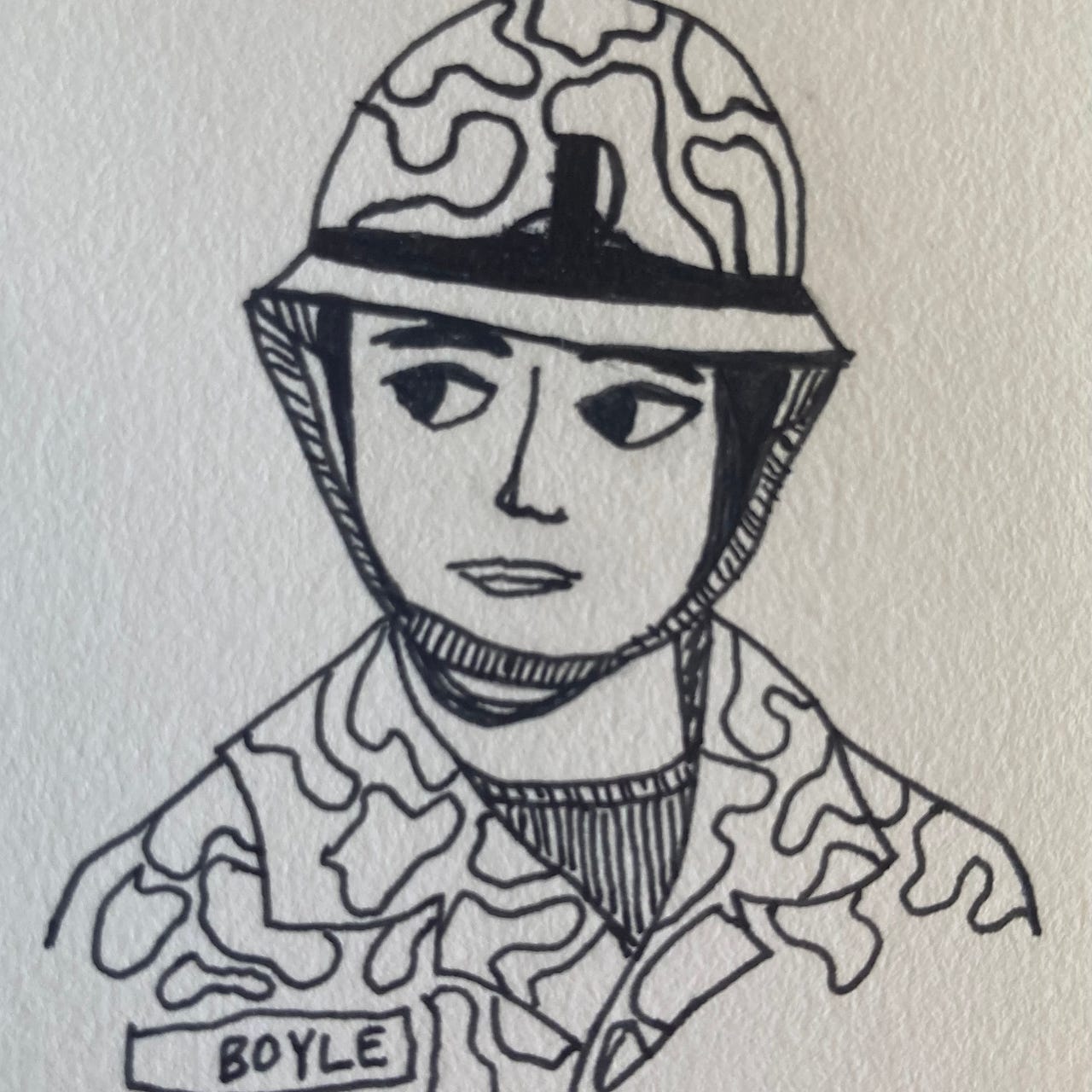In my last post, “Marx Goes to the Movies (Installment #1),” I investigated some of the Marxist ideas at work in the 2013 film Snowpiercer. In this post, I’ll take a closer look at one particular scene from that movie, a snippet we’ll call the School Car Scene.
Unhappy Fun
The reason we’re looking at this scene is to appreciate it as a work of satire. More specifically, as an excellent example of a satiric technique I call yellow laughter. Such laughter signals an uncomfortable, almost involuntary and painful form of humor elicited grudgingly from the reader or viewer of satire. The very crux of satire, after all, is to make us uncomfortable, to prompt us to think troubling thoughts and contemplate unhappy ideas, even as we anticipate having fun.
Yellow laughter is especially deft at carrying out this—let’s call it surprise distress.
How does this piquant mechanism work? Much like an ambush. Yellow laughter first confronts us with examples of human treachery and idiocy—the stock in trade of satire. A moment later, however, it dawns on us that we’re not just bearing witness to bad behavior. More than that, we are somehow implicated in these offenses. That is, we assent to them, we participate in them, we’ve done nothing to put an end to what we now recognize as villainous or stupid acts. Then, to add insult to injury, yellow laughter pries out of us, at our moment of awful realization, a joyless chuckle that comes entirely against our will.
If laughter, as philosopher Thomas Hobbes asserts, is sudden glory, yellow laughter is sudden shame.
Such raw and biting wit is a hallmark of a certain kind of satire. Satire of a philosophical, tragic, expository ilk that seeks to expose the enormities of human behavior. (Hint: Juvenalian.) This brand of satire spotlights aspects of our society that likely we’ve never noticed before—or been willing to notice or been trained not to notice. Yellow laughter upends our “normal.” Replacing our everyday is an unhappy idea for us to contemplate. Unwillingly.
Maybe no scene in Snowpiercer—a film rife with unhappy ideas—kicks us in the head quite so hard as the School Car Scene. In it, yellow laughter transforms innocent into sinister.
The Disgrace of Modern Schooling
In Snowpiercer there’s plenty of evidence of direct police muscle at work. Anyone deemed to be a problem (particularly a “tail-sectioner”) is subjected to gruesome summary punishment, imprisonment, or being set upon by gun-toting soldiers and blade-swinging thugs. Violence creates order within this strange microcosm of capitalism. Hard at work, then, is Louis Althusser’s notion of a modern Repressive State Apparatus (RSA) where force—either actual or implied—upholds the status quo. The “Truth” of the owner/engineer of the train, Wilford (Ed Harris), is maintained by the exercise of despotic Power.
Equally operational on the train is Althusser’s concept of an Ideological State Apparatus (ISA). ISAs are non-physically violent ways to maintain control over a population. These measures operate by way of training citizens to believe in a certain description of reality—a reality, needless to say, that’s designed to keep those in power, well, in power. For Althusser, this process involves inveigling people into an imaginary relationship with their actual conditions. Specifically, modern ideology specializes in telling us that we are free subjects, when in fact the system to which we accede is run by a privileged few who do not have our best interests—let alone our freedom—in mind.
Among the most notorious modern ISAs is schooling—the far greater purpose of which is indoctrination, not education. (And I say this as an educator!) In his School Car Scene, filmmaker Joon-ho Bong takes full satiric aim at this dishonest institution.
This scene is the most screwball episode in the movie—which is saying a lot. The sequence combines a 1950s warm-and-fuzzy innocence with a 21st-century bitter experience, all performed on a knife-edge of tension and with the hyperbole of farce. The upper-class (“forward-section”) schoolchildren are well-scrubbed and obediently enthusiastic as the sugar-sweet, young, pretty, and pregnant Teacher (Alison Pill) shoves ludicrous propaganda down their little throats. The appalled tail-sectioners, led by Curtis (Chris Evans), witness these lessons with astonished disbelief. They know—by their lived experience on the train—that what these kids are being taught is complete bullshit.
Two of the tail-sectioners, Tanya (Octavia Spencer) and Andrew (Ewen Bremner), are fighting their way forward on Snowpiercer in a frantic effort to recover their abducted children. One of the schoolchildren, a well-mannered little boy, is helpful in telling them that, indeed, those children passed through the School Car heading toward the front of the train. However, a cute little blond girl, in classic teacher’s pet fashion, then blurts out: “I heard all tail-sectioners were lazy dogs and they all drink their own shit.” Obviously, growing up in affluence, these schoolchildren are being deliberately acculturated into the vicious and self-serving upper-class prejudices of their parents.
More than just soaking up social stereotypes, these children are being actively taught—that is, trained to believe—a specific worldview. Namely, a political and economic dogma centered around the worship of the eccentric industrialist who built Snowpiercer. After showing the class the curiously dated informational video about Wilford, the Teacher poses a leading question to the class about CW-7 freezing the world. “So what did the prophetic Mr. Wilford invent to protect the chosen from that calamity?” The children shout back in well-drilled unison: “The Engine!” Teacher, pupils, and Minister Mason (Tilda Swinton) all then chant, with accompanying gestures, in praise of the miracle machine: “Rumble rumble, rattle rattle, it will never die!”
The Teacher next leads the class (Mason again joining in) in a song of praise for Wilford’s wonderful Engine.
Teacher: What happens if the Engine stops?
Children: We all freeze and die.
Teacher: But will it stop, oh, will it stop?
Children: No! No!
Teacher: Can you tell us why?
All in chorus: The Engine is eternal. Yes! The Engine is forever. Yes! Rumble rumble, rattle rattle!
Teacher: Who is the reason why?
All in chorus: Wilford! Yah! Wilford! Wilford! Hip hurray!
After this anthem, Mason turns simpering to Curtis to remark, “I love that one. Such a tonic.” Meanwhile, Curtis and his fellow tail-sectioners—filthy, brutalized, and starved at the hands of Wilford—can hardly believe the ludicrous instruction going on around them.
At this point, a third concept of Althusser’s warrants mention. Interpellation. This social phenomenon is a powerful tool for both instilling and enforcing conformity. Within modern society, the individual constantly is summoned to become a member of what’s portrayed as normal life. We are both recruited and demanded to recognize ourselves as citizens of the state, meaning that we come to believe in and abide by all the conventions and regulations of the “ordinary” and “everyday.” Again, school plays an essential role in this conditioning.
These chants and songs being drilled into the heads of the children aboard the School Car are obvious and vile acts of interpellation. Yet how different are they from the Pledge of Allegiance and prayers we were all compelled to recite in school? In both cases, propaganda is inculcated into young, vulnerable minds. On Snowpiercer, the programming results in Wilford Worship. In America, it produces faith in the American Dream and some version of God. What’s more, key to each fabrication is telling children that they are exceptional—“the chosen”—and that the way of life they were born into is not only “normal” and “natural,” but superior to all others.
And boom goes the dynamite of yellow laugher—the sudden and shameful recognition of yourself as the target of the satire.
After the singalong, the Teacher conducts an actual lesson for her pupils. As the train passes by the frozen bodies of “The Revolt of the Seven,” she uses these rebels as a terrifying example of what happens if you dare to exit Wilford’s train. In short, disobedience equals death. The lesson concludes in an exercise of rote memorization. The Teacher begins the Wilfordian tenet with: “If we ever go outside the train...” to which the children all formulaically reply: “...we all freeze and die.” Then she prompts: “If the Engine stops running...” and the kids respond: “...we all die.” Then she asks: “And who takes care of the Sacred Engine?” to which they all shout “Sir Wilford!” This teachable moment is accompanied by Teacher and students performing ritualistic hand gestures.
Ah, school daze.
Of course, we discover later in the film (as I pointed out in my last post) that these periodic “rebellions” of the lower-class passengers are coordinated by Wilford himself. They are killings deemed necessary both to balance the population and maintain authority on the train.
Bong ends his lampoon of modern schooling with a reminder of the violence underlying such meticulous brainwashing. The man wheeling through a cart of “New Year Eggs from Mr. Wilford” delivers a concealed gun to the Teacher. She opens fire on the tail-sectioners, killing Andrew and being killed herself by a knife hurled into her throat by one of the tail-sectioners. (If you haven’t already watched the scene, take a look at it now.) Needless to say, such carnage jars harshly with the wholesome, child-friendly setting of the schoolroom. However, our modern identity—that is, our status as subjects to the state—must be imposed at any cost. Submission to Wilford’s domination and exploitation comes about through a combination of brute force (RSAs) and systematic manipulation (ISAs).
Speculative Satire Does Not Muck About
On this choo-choo from hell, we witness extreme wealth inequity (forward cars/tail cars), acute accumulation by dispossession (tail-sectioners have nothing so that the forward-sectioners can have everything), unchecked corporate power (Wilford Industries as a corporate state under the authority of a single CEO), and unremitting workplace abuse (the sadistic finishing touch being child labor).
Not a pretty picture of capitalism in action.
We’re shown as well the means by which this neoliberal autocracy holds power. Policing and religiosity.
Mason in particular incessantly insists on Wilford-as-God, always characterizing him as “divine” and “merciful” while calling his locomotive the “Sacred Engine.” However, the “Eternal order” of every passenger’s “preordained position” on Snowpiercer that Mason insists upon is a twisting of Christian dogma into neoliberal tenet.
The cold fact is that the ruling elite aboard the train care nothing for the spiritual comfort of the passengers but everything for keeping citizens in their “correct” socio-economic place.
As an earthly (as opposed to heavenly) shepherd of subjects (as opposed to souls), the modern state seeks to know—and thereby shape—the inside of people’s minds. Whereas the traditional Christian pastorate fashions hearts and minds for salvation, the pastoral state molds the attitudes and thinking of individuals into a functional sameness that suits the social system. Mason’s title as “Minister” seems an apt conflation of these church and state purposes: she spouts quasi-religious Wilfordian creed as one of many techniques to maintain civic order aboard Wilford’s train. And, when that religiosity fails, she happily calls in police muscle.
In many ways, the School Car Scene crystalizes all of these modern techniques of power for the moviegoer. We witness how this malevolent religiosity not only serves as the foundation for educating the “train babies” aboard Snowpiercer, but how, when the Egg Man shows up, that faux-spirituality is undergirded solely by violence and superior weaponry.
Not a pretty picture of the modern state in action.
Driving home this satiric exposé of the neoliberal regime is Bong’s use of yellow laughter. That is, as viewers of this seemingly zany scene, we’re suddenly smacked with a stark and awful realization.
These schoolchildren are us.
This form of schooling has been perpetrated on us as well. Just as these train kids are being indoctrinated into a Wilfordian social order, we were indoctrinated into a selfsame Capitalist social order. In this School Car Scene, we are the ones actually being schooled.
Kind of leaves you with a wan grin and the sick feeling of wondering just what kind of lies were drummed into your dear little ears.
COMING IN TWO WEEKS: the enigma of the Uncommitted Voter...
AND DON’T FORGET...
Read some provocative fiction. Check out and subscribe to my other Substack newsletter, 2084 Quartet at:
While you’re at it, read some provocative social commentary. Check out and subscribe to this absolute Substack gem as well:








"If laughter, as philosopher Thomas Hobbes asserts, is sudden glory, yellow laughter is sudden shame."
I feel this one!
Sure DOES kick one in the head--the film and your interpretation!